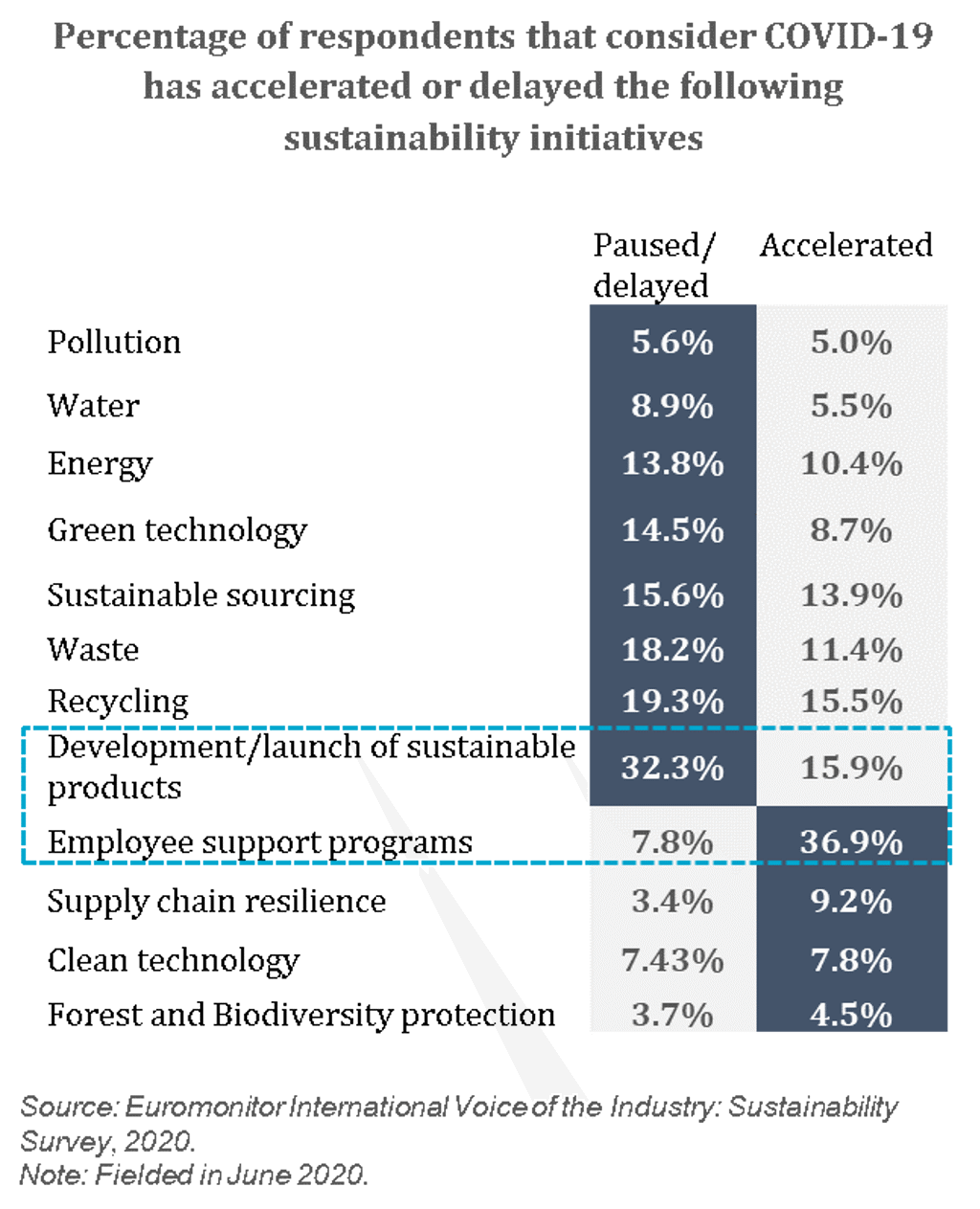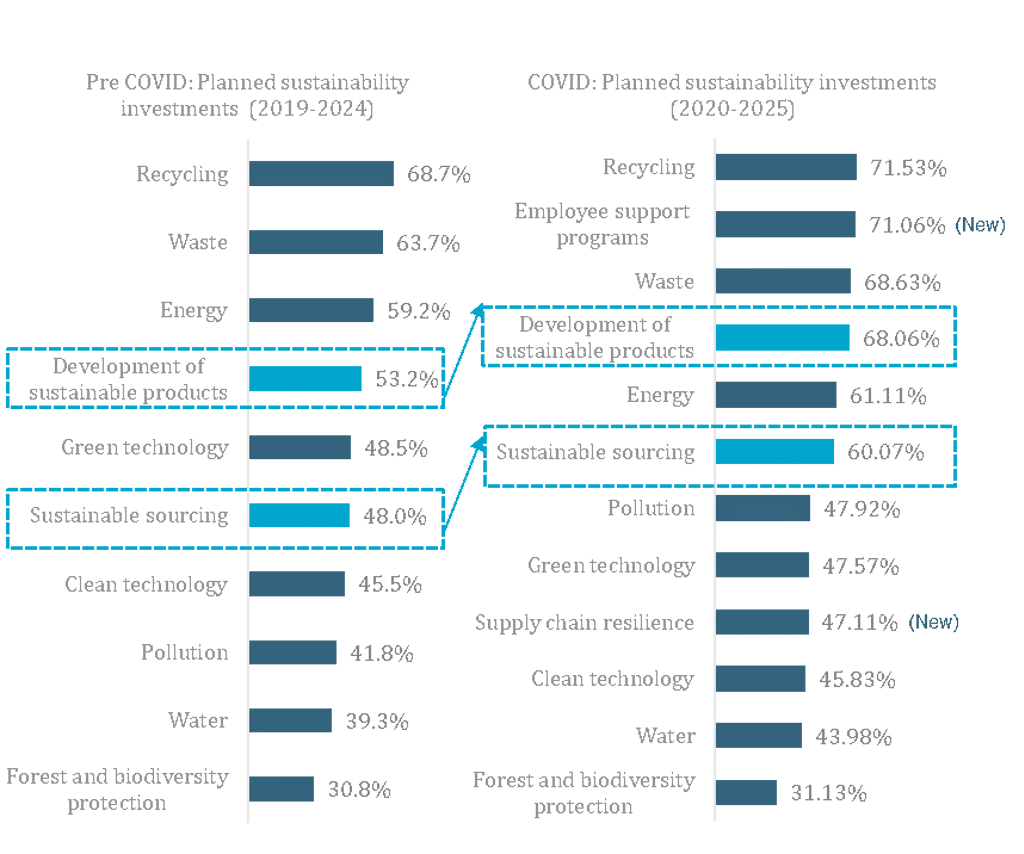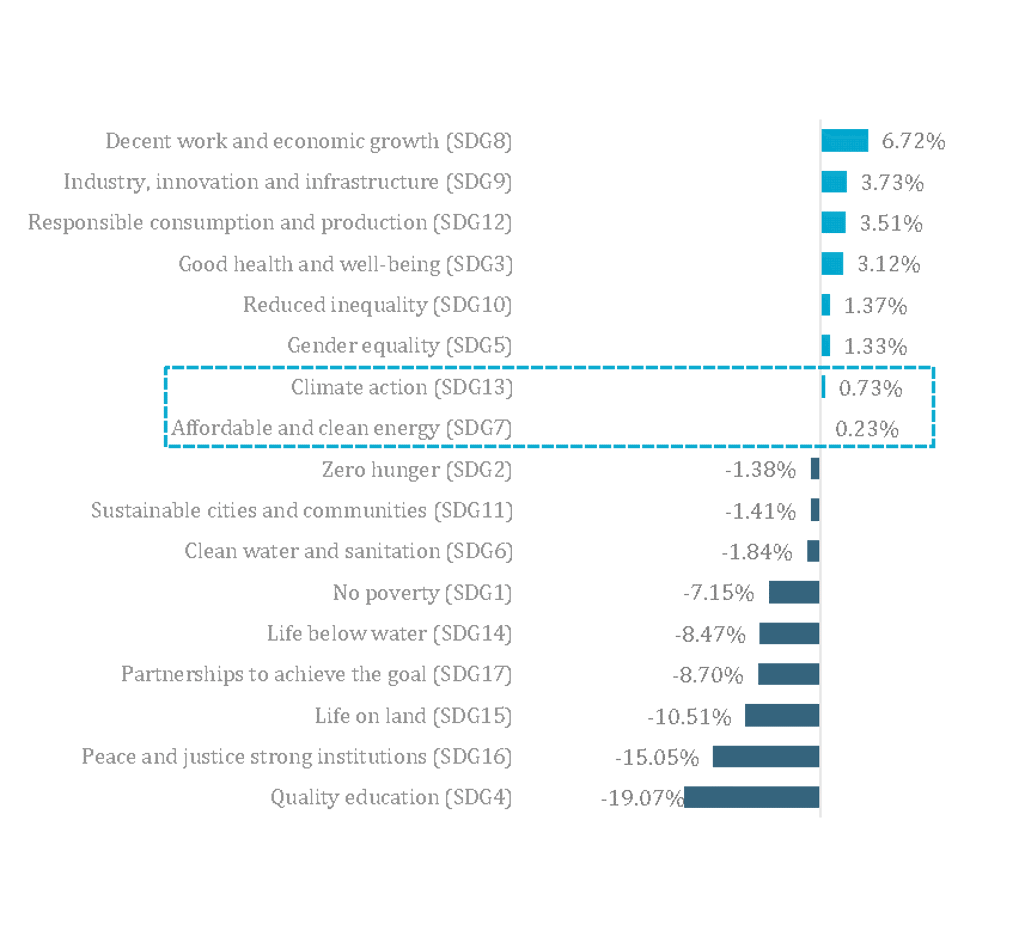Prior to Coronavirus (COVID-19), sustainability was already at the top of the agenda for many corporations, with a focus on pressing environmental problems such as climate change and plastic waste. The 2020 Euromonitor Voice of the Industry Sustainability survey reveals that the pandemic has broadened the conversation, reflecting new social awareness, with brands showing an unprecedented level of attention to issues related to employees, suppliers and local communities.
While "reducing the impact on the environment" remains the top definition for sustainability in 2020, COVID-19 has brought social purpose to the fore, with two-thirds of surveyed companies defining sustainability as "supporting local communities“ (a 15-percentage point increase compared to the previous year). 51% link sustainability to supporting employees, and 49% associate the term with providing support to suppliers and business partners.
Putting people first during the outbreak
During the initial stages of the COVID-19 outbreak, businesses have focused on dealing with the short-term shock of the crisis, with the health, wellbeing and safety of both consumers and the workforce becoming the main priority, while other areas were put on hold. The most negatively affected area was the development and launch of sustainable products alongside key priority pre-COVID projects related to waste and recycling:
The pandemic caused a four-month delay in the launch of Loop’s online refilling platform in the UK, which was originally meant to be up and running as a pilot program in March 2020. Recycling company Terracycle and UK supermarket Tesco decided to push back the launch of this zero-waste shopping service that is now delivering 150 items in reusable containers to Tesco’s consumers. Despite the delay, with e-commerce booming, COVID-19 is expected to bring opportunities for innovation in reusable packaging that are safe and hygienic.
COVID-19 Impact on Sustainability Initiatives
However, during the first half of 2020 businesses have accelerated investment in social initiatives to support the workforce, with 59% of surveyed companies prioritising social over environmental issues as per Euromonitor International’s June 2020 Sustainability survey results. Companies are reconsidering their working policies, with many embracing new work patterns, including co-working spaces or allowing employees to work remotely.
COVID-19 is shifting business priorities
Despite the COVID-driven pause on some initiatives, companies are planning to invest more in a range of sustainability projects in 2020 than they were before the pandemic, with the development of sustainable products and sustainable sourcing being the two areas benefiting the most, as shown when comparing responses between the 2019 and 2020 Sustainability surveys.
While recycling remains the main area for investment, what the outbreak has changed, however, is the way companies look at the workforce and supply chain security. These results demonstrate that despite the unfolding economic crisis, businesses are thinking beyond a short-term cost-cutting mentality, with 73% of companies investing in sustainability to build brand reputation.
Priorities in Sustainability Investments: Before and After COVID-19
Source: Euromonitor International Voice of the Industry: Sustainability Survey. Note: Surveys fielded in May 2019 and June 2020
Action on climate change remains strong
The pandemic hit at a time when the Sustainable Development Goals (SDGs) gaining traction, positively affecting some of them, especially those related to social issues and innovation, while having a negative impact on goals related to education and peace, along with some environmental goals.
Despite initial concerns about the pandemic affecting the climate change momentum, climate action and access to affordable and clean energy, key to achieve a net-zero economy, seem unaffected by the outbreak, meaning that tackling climate change continues to be a priority for companies despite the health and economic crises.
Change in the Level of Engagement with Sustainable Development Goals (SDGs) since COVID-19
Source: Euromonitor International Voice of the Industry: Sustainability Survey. Note: Surveys fielded in May 2019 and June 2020
Many countries are keeping pre-pandemic commitments to become “net-zero”, aiming to decouple carbon emissions from economic growth amid the global economic recession. According to the Voice of the Industry: COVID-19 survey, performed in July 2020, 20% of surveyed companies expect the lower CO2 emissions due to decreased transport to be a permanent shift in consumers’ behaviour.
Indeed, key players are now launching new carbon targets that promise to accelerate the transition towards a net-zero future. For instance, oil and gas companies are quickly responding to the lower oil prices forecast, as governments speed up plans to cut carbon emissions. In June 2020, BP sold its petrochemical business to Ineos in a USD5 billion deal, and in July 2020, the company unveiled its new sunflower logo and its “Beyond Petroleum” slogan and announced plans to cut oil and gas production by 40% by 2030.
What purpose looks like after the pandemic
Increased social awareness is expected to remain, and it is highly unlikely to cast a shadow over pre-COVID-19 environmental concerns such as climate change, as demonstrated by the June 2020 Sustainability survey results, with 61% of businesses expecting to balance social and environmental issues as the crisis evolves
With the purpose-driven movement gaining mass popularity during and beyond the outbreak, many brands will emerge from this crisis with a new sense of purpose, aiming to deliver economic profit while doing good for the society and the planet.
The COVID-19 crisis has demonstrated the agility and flexibility of businesses, with companies pivoting supply chains and redesigning digital strategies in a matter of days. With the rules of the game now changed as the world commences a recovery path, and with consumers becoming less tolerant to unsustainable business practices, brands have a unique opportunity to build back better, delivering on their purpose-driven promises.
For more insights on the future outlook in the sustainability space, download the full report Rethinking Sustainability: No Purpose, No Gain



